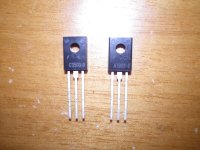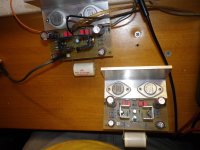@PMII will give it a shot by Mon~Tue. Busy weekend, otherwise I would do it today.
If you have any particular test conditions in mind, please post them.
count me two point 😀
how about:
not use the small heat sink on the VAS tr, put them on main heatsink
higher gain 🙂
that would be very nice to know
thanks in advance
Within some range, you can change the gain by changing the feedback resistor value. I don't know how far you can go, or what to test, other than looking for instability etc.higher gain 🙂
I am curious about that myself. I agree that mounting all four transistors on one heatsink has potential advantages, so it is worth a try.not use the small heat sink on the VAS tr, put them on main heatsink
I did not do this in my layout for two reasons.... One, it would have made the board bigger, and the length of the traces from the first stage to the VAS, or from the VAS to the gate of the mosfets would be longer.
Two, I am concerned that people who drill and tap their own holes will find it more difficult to align 4 holes compared to just two. With two holes, you can pretty much let the transistors align themselves and solder the leads after the board is mounted on the heatsink. Four makes that more difficult, especially if you also need a spacer for the smaller VAS transistor. (LC solved that by including the spacers in his kit.)
Closed feedback loop voltage gain +31 dB (x 35,5) tested and no instability whatsoever can be reported. Input sensitivity at this gain is less than 1 Veff for full output power. 😉
Hi, Lazy Cat that's greatClosed feedback loop voltage gain +31 dB (x 35,5) tested and no instability whatsoever can be reported. Input sensitivity at this gain is less than 1 Veff for full output power. 😉

I will try to make new VSSA with bigger size, bigger gain, & biger elco's 😀
@PMI, ok, I'm waiting 😎
if good we can save two little heat sink &
for me it is easier to make 4 holes than find 2 little heat sink
it look you get excited Bli John... 😀
mine running on smps with +-42vdc
i have a plan to make new board with optional compansation cap and trimmer.
i've found with change tr vas sometimes it need compensation, tried on bd139/140, sa1360/sc3423, sa1380/sc3502, sa1381/sc3505
mine running on smps with +-42vdc
i have a plan to make new board with optional compansation cap and trimmer.
i've found with change tr vas sometimes it need compensation, tried on bd139/140, sa1360/sc3423, sa1380/sc3502, sa1381/sc3505
Last edited:
Even if mono, you have surprise waiting for you. Will wait for your review.
OK Shaan


HI PMI!
Greets:
Tyimo
250VA for one chanel?I expect to get about 40W/channel, with a transformer 25V AC (rms) secondary winding, and I am using a 250 VA transformer, which is plenty of power for my version of this amp.
Greets:
Tyimo
Hi
I use those sc3503 sa1381 i get more clear at 500khz like LC waves at 23mA but the offset not stable .Must do something? Any changes ?
23 mA is too much for VAS, 12-15 mA is optimal. Input pair on the same temp (must be glued together), their gain match, VAS BJT gain match, PSU symetry if you use only resistors (not CCS) for input stage bias current, check them all, since all of them affects output DC offset. 🙂
VSSA T03
Many thanks LC
with BD139-140 everything is operating correctly. 15-17mA very stable offset
but with sc3503 sa1381 appear minor details.
I saw in your amp on Vas stage you use cap 100pf colector and ground - and 5.6 pf comp ?
23 mA is too much for VAS, 12-15 mA is optimal. Input pair on the same temp (must be glued together), their gain match, VAS BJT gain match, PSU symetry if you use only resistors (not CCS) for input stage bias current, check them all, since all of them affects output DC offset. 🙂
Many thanks LC
with BD139-140 everything is operating correctly. 15-17mA very stable offset
but with sc3503 sa1381 appear minor details.
I saw in your amp on Vas stage you use cap 100pf colector and ground - and 5.6 pf comp ?
Last edited:
Many thanks LC
with BD139-140 everything is operating correctly. 15-17mA very stable offset
but with sc3503 sa1381 appear minor details.
I saw in your amp on Vas stage you use cap 100pf colector and ground - and 5.6 pf comp ?
More gain with SA/SC VAS also brings more sensitivity to temp fluctuations. If you bolt VAS pair to the main heatsink you get more steadiness to temp fluctuations.

Yes 5,6 pF only for Miller and 100 pF to GND, sharp eye you have. 😎
VSSA T03
I see also 470 Ω on P gate and 1000 Ω on N gate .
But probably I am wrong. its for TLVH431 .
More gain with SA/SC VAS also brings more sensitivity to temp fluctuations. If you bolt VAS pair to the main heatsink you get more steadiness to temp fluctuations.
Yes 5,6 pF only for Miller and 100 pF to GND, sharp eye you have. 😎
I see also 470 Ω on P gate and 1000 Ω on N gate .
But probably I am wrong. its for TLVH431 .
Last edited:
I see also 470 Ω on P gate and 1000 Ω on N gate .
But probably I am wrong.
Zero both now. 😀
Zero both now. 😀
I look always the waveforms you give in load 8Ω
and actually has no big breaks the square waveform but """Zero both now"" incredible!!
I can not stop listening this amp. Is a masterpiece but do not need to tell you this .
Best Regards Mr LC
LC, Shaan,
Speaking of gain match in the VAS, I just bought a bunch of the Fairchild KSC3503D and KSA1381E (I couldn't get devices of the same Hfe rank) and found that although the ranks overlap my KSA have about twice the gain of the KSC and none are all that close. These then won't be suited to future VSSA builds?
Speaking of gain match in the VAS, I just bought a bunch of the Fairchild KSC3503D and KSA1381E (I couldn't get devices of the same Hfe rank) and found that although the ranks overlap my KSA have about twice the gain of the KSC and none are all that close. These then won't be suited to future VSSA builds?
OK, what I have here is 100 pieces each Fairchild KSC3503D and KSA1381E, bought from Mouser. The gain testing was done on a DMM as a pre-sorting exercise which was intended to lead to further matching. The KSA range from a low Hfe of 133 to a high of 145 while the KSC range from a low Hfe of 76 to a high of 89. Quite different from each other.
According to Fairchild the other Hfe ranks are now obsolete, all new KSA will be E rank and KSC will be D rank which will largely preclude these devices where reasonably close matching is needed. Hope I didn't waste my money.
According to Fairchild the other Hfe ranks are now obsolete, all new KSA will be E rank and KSC will be D rank which will largely preclude these devices where reasonably close matching is needed. Hope I didn't waste my money.
Last edited:
I look always the waveforms you give in load 8Ω
and actually has no big breaks the square waveform but """Zero both now"" incredible!!

I can not stop listening this amp...
Of course. Nobody can. 😀
...these then won't be suited to future VSSA builds?
Yes these can be used, but, 1)offset will get a mind of its own, and may be 2)more even harmonix than oddz.
If you want your peeceebee to sound warm then use input and VAS pairs which are miles apart hFE wise(you may actually like the sonix, I like my DOZ very much 😀 ). But, for the real thing, close matching is necessary and within +/-20 is good, as Andrej said.

LC, Shaan:
Any thoughts on some of the alternatives such as 2SA1507/2SC3902 and KSA1220/KSC2690 for the VAS devices? These look to be readily available in same rank Hfe. They seem to have decent specs save for Cob, which is somewhat higher than the coveted A1381/C3503. Other recommended devices?
Any thoughts on some of the alternatives such as 2SA1507/2SC3902 and KSA1220/KSC2690 for the VAS devices? These look to be readily available in same rank Hfe. They seem to have decent specs save for Cob, which is somewhat higher than the coveted A1381/C3503. Other recommended devices?
- Home
- Amplifiers
- Solid State
- PeeCeeBee

